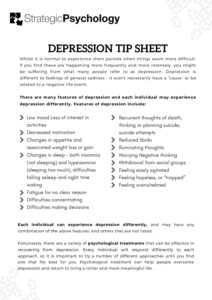
Depression Tip Sheet
855 KB
Whilst it is normal to experience short periods when things seem more difficult, if you find these are happening more frequently and more intensely, you might be suffering from what many people refer to as depression. Depression is different to feelings of general sadness – it won’t necessarily have a “cause” or be related to a negative life event.
There are many features of depression and each individual may experience depression differently. Features of depression include:
Low mood
Loss of interest in activities
Decreased motivation
Changes in appetite and associated weight loss or gain
Changes in sleep – both insomnia (not sleeping) and hypersomnia (sleeping too much), difficulties falling asleep and night time waking
Fatigue for no clear reason
Difficulties concentrating
Difficulties making decisions
Recurrent thoughts of death, thinking or planning suicide, suicide attempts
Reduced libido
Ruminating thoughts
Worrying
Negative thinking
Withdrawal from social groups
Feeling easily agitated
Feeling hopeless, or “trapped”
Feeling overwhelmed
Each individual can experience depression differently, and may have any combination of the above features, and others that are not listed.
Fortunately, there are a variety of psychological treatments that can be effective in recovering from depression. Every individual will respond differently to each approach, so it is important to try a number of different approaches until you find one that fits best for you. Psychological treatment can help people overcome depression and return to living a richer and more meaningful life.
Recognise the warning signs
Warning signs that may indicate that you are experiencing depression include:
Difficulty getting out of bed in the morning, or getting up later
Having disturbed sleep
Feeling teary, stressed, irritable
Withdrawing, avoiding social contact, or spending a lot of time alone
Skipping meals and eating unhealthily
Difficulty concentrating
Recovering and staying well
If you are experiencing features of depression, the following tips can be useful in helping you to stay healthy.
- Talk about your feelings and emotions with trusted friends and family. Even though it may seem hard, it is important to talk with someone that you trust about how you feel. You could talk with a family member, friend or a trusted colleague. A general practitioner (GP) is also a helpful place to start when seeking help and information.
- Stay connected with and spend time with people you like and trust. This might be the last thing you feel like doing, but it is important to keep connected with others to increase levels of confidence, support and an overall sense of wellbeing.
- Plan activities that are enjoyable, interesting, relaxing or satisfying to you. At first these might not be as enjoyable as they used to be, but with time and persistence, the enjoyment will likely return.
- Eat a healthy and varied diet. Learning to make simple meals that don’t take too much time or energy to prepare can be helpful when you don’t have much energy. It can also be helpful to make use of the times when you feel energised to prepare and plan ahead.
- Stay physically active. Physical exercise can help relieve muscle tension and relax your mind. Try to do some exercise daily – even if it is just a short walk. Keep it simple and enjoyable.
- Ensure you get the sleep you need. Sleep is important in helping our bodies and minds relax, recover and recharge. Allow at least 30 minutes to wind down before bedtime. Avoid caffeine after 4pm, and avoid using alcohol to help you fall asleep – using alcohol causes poor quality sleep, and results in more frequent waking-up.
- Avoid drinking alcohol or taking drugs.
- If you think you are becoming depressed, take action early and be proactive.
- Seek support from a health practitioner, such as your GP or a psychologist. An important part of professional support is often psychological therapy. Psychological therapy focuses on assisting you to build skills to deal with the stresses in your life and change your responses to unhelpful thinking patterns.